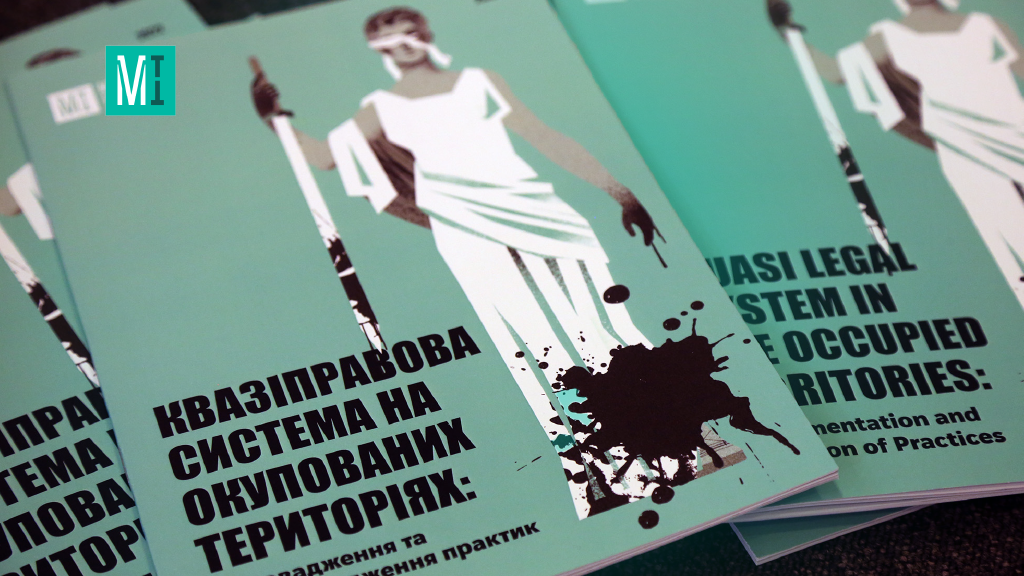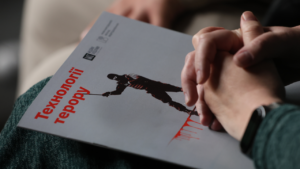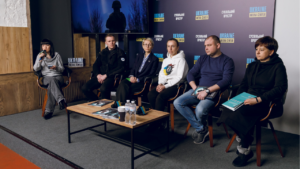Territories of Evil. How the Quasi-legal System Operates in the Occupied Territories

On December 22, the Media Initiative for Human Rights (MIHR) presented an analytical report titled Quasi-legal System Operates in the Occupied Territories: Implementation and Adoption of Practices. It is an attempt at defining the regulatory system in place in the occupied territories of Donetsk and Luhansk Regions and determining whether or not it is lawful and whether it secures the right of citizens to a fair trial.

Photo – Viktor Kovalchuk/MIHR
Since the start of the full-scale invasion, MIHR analysts have been studying the quasi-legal system instituted by the Russian Federation in the occupied territories of Donetsk and Luhansk Regions: researching the activities of the law enforcement agencies, quasi-courts, and pseudo-prosecutorial authorities by interviewing released hostages and military personnel, studying information in the public domain, and interviewing their own sources in the regions temporarily controlled by Russia. The information gathered in the wake of the full-scale invasion on February 24 has made it possible to predict how the events will unfold in the occupied territories: how the occupation authorities will be put in place, how the quasi-legal agencies will operate and, most importantly, how this will affect the civilian population in these regions.
“We worked on this report for more than a year. This work began under completely different circumstances but its goal has become even more relevant after the full-scale invasion by the Russian Federation. We had to reformat the topic: initially we researched the quasi-legal systems formed in the occupied territories of Donetsk and Luhansk Regions, but after February 24 we realized that it was worth studying the situation in the newly occupied territories, particularly those of Kherson and Kharkiv Regions. Many experts are reluctant to research these systems so as not to legitimize them. However, this approach limits our understanding of what is happening there in reality,” says Olha Reshetylova, a coordinator with the MIHR.

Olha Reshetylova. Photo – Viktor Kovalchuk/MIHR
The report authors focused on the most glaring human rights violations, such as arbitrary deprivation of liberty for an indeterminate period, denial of the right to defense, denial of the right to communication with the outside world, conditions in which detainees are kept in custody, and denial of the right to a fair trial.
Access denied
When the occupation began in 2014, Ukrainian law enforcement agencies and courts could not operate in the territories over which the Ukrainian government lost control.
“At first they stopped working and eventually were forced to evacuate,” says Tetiana Katrychenko, study co-author and MIHR coordinator, adding: “We understood that their place had to be taken by some new agencies to be formed under occupation. That’s just what happened, as so-called ‘people’s police’, ‘ministry of state security’, ‘office of the prosecutor general’, and ‘courts’ appeared. We studied the process by which these agencies were instituted. After February 24, we saw that the Russian Federation began resorting to the same practices in the newly occupied territories.”

Tetiana Katrychenko. Photo – Viktor Kovalchuk/MIHR
In reality, these quasi-law enforcement agencies failed to carry out their law enforcement functions, while the quasi-courts failed to ensure the proper administration of justice. Respect for fundamental human rights in the occupied territories is merely declarative, particularly when it comes to politically-motivated arrests. We are referring to arrests, detention, and “conviction” of Ukrainian citizens on charges of “high treason”, “espionage”, “terrorism and sabotage” based on suspicions of collaboration with the Ukrainian law enforcement agencies and army. Forcible abductions, arbitrary arrests, and illegal detention of civilians became tools used by the occupation authorities to institute these quasi-legal systems.
Further proof of this is the story of Liudmyla Huseynova, who was arrested in occupied Donetsk and imprisoned for her volunteering and pro-Ukrainian stance. She spent more than three years behind bars and directly interacted with all participants of this quasi-legal system: so-called “investigators”, “prosecutors”, and “judges.”
Behind closed doors
According to the former hostage, the “investigator” had her sign a blank sheet of paper after her arrest.
“‘What kind of difference does it make to you? Sign it,’ he said. And I had to sign it because I was sitting handcuffed, with a bag over my head, and had no other choice. Two years later they finally concluded their ‘investigation’ and sent my case to court. The trial happened behind closed doors,” Huseynova recalls, adding: “I managed to make a photocopy of the so-called verdict of the ‘supreme court’ of the ‘Donetsk People’s Republic’. The trial happened in my absence. Even the attorney was not present. And the ‘supreme court’ concluded that the article under I faced charges—‘espionage’—carried a sentence of life in prison or death penalty. Since the death penalty did not apply to women at the time, the ‘supreme court’ was unable to try me. That’s how my case got referred to an interdistrict court. Half a year later, without any notice, I was taken to the so-called Voroshylov Interdistrict Court. I didn’t know that a trial was going to happen. I wasn’t preparing for it. The so-called attorney, judge, and prosecutor were there.”

Liudmyla Huseynova. Photo – Viktor Kovalchuk/MIHR
During the “trial”, Liudmyla Huseynova said that she did not deny her pro-Ukrainian stance but categorically rejected the espionage charges. “The “judge” asked why I did not deny the charges when I was at Izoliatsia or at the pretrial detention center. I replied that I attempted to deny the charges. But the investigator said (half a year after I was taken to the pretrial detention center): ‘If you deny it, you will be taken to Izoliatsia again. I chose the pretrial detention center because I wanted to survive and tell the world the truth about what was going on there. We were called inmates, but we were simply hostages without any rights or defense. Everybody who participated in this lawlessness must face justice,” Liudmyla Huseynova stresses.
According to Maksym Tymochko, study co-author and lawyer with Umbrella JSC, the Russian Federation—as a state signatory of the Convention for the Protection of Human Rights and Fundamental Freedoms—must abide by all principles in all territories where it has effective control.

Maksym Tymochko. Photo – Viktor Kovalchuk/MIHR
“The Russian Federation has effective control in the occupied territories. There are no longer any doubts about that. Accordingly, it must do everything to rule out such a form of punishment as the death penalty because it is prohibited by the European Convention. Every member state of the Council of Europe and a state signatory of the Convention must prohibit this kind of punishment. However, this ban has not been imposed in the so-called quasi-republics, which is a glaring violation. It is a territory of evil and we must do something about it,” Tymochko stresses.
Attorney – prosecutor. Defense is nonexistent
The study separately explores the role of “attorneys”.
The MIHR managed to interview actual “attorneys” working in the quasi-legal system in the occupied territories.

Photo – Viktor Kovalchuk/MIHR
“Judges and attorneys are the most graphic representatives of this quasi-legal system. Very often they are people who used to be Ukrainian certified attorneys but remained to work in the occupied territories after 2014. Speaking of politically-motivated arrests, there is a certain number of attorneys in the ORDLO who are formally called attorneys, join the proceedings formally at a certain stage and meet with their clients (this almost never happens during the first weeks—or even months—after the arrest). But they do not defend their clients. They can relay information from a client to relatives or deliver a package. Such attorneys are appointed and their services are officially free. However, after the first meeting with the client or their family the attorneys ask to be paid for their services to keep them working on the case. Notably, attorneys are already attempting to work like this also in occupied Kherson Region and are also using the same approach in Crimea to newly detained civilians whom Russians take to the occupied peninsula from the south of Ukraine,” Tetiana Katrychenko says.
According to the study authors, the MIHR has dozens of testimonies saying that attorneys acted as prosecutors in the occupied territories. “In some cases an attorney came to the detainee who told him about having been subjected to torture through electrocution, but the attorney simply pretended not to hear this. When detainees said that they were denied food and water and were kept in rooms without any amenities, the attorney would say: ‘What did you expect? You are a political prisoner after all’,” Katrychenko says.
Undeniable control
Andriy Yakovlev, an expert with the MIHR and a lawyer with the Regional Human Rights Center, who also worked on the study, emphasizes the importance of studying the crimes taking places in the occupied territories as they come under enemy control, when the authorities change and a judicial system gets instituted.
While in 2014 international partners had doubts about interpreting the conflict in the east of Ukraine, after February 24, 2022 nobody has doubts that Russia has established effective control over the occupied territories of Ukraine.

Andriy Yakovlev. Photo – Viktor Kovalchuk/MIHR
“For our part, since 2014 we have been working on proving the effectiveness of such control, since military support for these territories in the part of the Russian Federation is extremely powerful and all-encompassing. Where there is control, there is responsibility of the state. Where there is responsibility of a state, we can demand liability at the international level. We also should not forget about criminal liability at the individual level. Crimes have been committed by specific individuals, servicemen, and officials. We should not forget that war crimes are committed not just by servicemen, but also by civilians, judges, prosecutors, and investigators,” Maksym Tymochko points out.

Photo – Viktor Kovalchuk/MIHR
As he put it, the use of summary executions is one of the indicators of the absence of a law-governed system that the occupants were expected to put in place. “Summary executions are also part of Russia’s practices since 2014. We remember Ukrainian prisoners of war subjected to summary executions by Wagner mercenaries. We remember civilians murdered by the occupants in the occupied territories. It is further proof of the lack of a law-governed system,” says Maksym Tymochko.
The analytical report has been prepared within the framework of the Matra Programme (Embassy of the Kingdom of the Netherlands).
The report is available in two languages:
Quasi Legal System in the Occupied Territories: Implementation and Adoption of Practices
Квазіправова система на окупованих територіях: впровадження та розповсюдження практик






